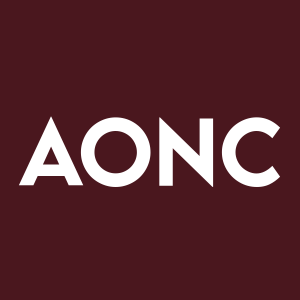More Than 40 American Oncology Network Clinics Across 18 States and Washington, D.C., Now Offering Bispecific T-cell Engager Therapies to Patients
Rhea-AI Summary
American Oncology Network (NYSE:AONC) has expanded its Bispecific T-cell Engager (BiTE) therapy availability to more than 40 partner practice clinics across 18 states and Washington, D.C. This innovative immunotherapy treatment, implemented since March 2025, targets multiple cancer types including acute lymphoblastic leukemia, uveal melanoma, diffuse large B-cell lymphoma, follicular lymphoma, multiple myeloma, and extensive-stage small cell lung cancer.
The BiTE therapy works by engineering antibodies to target both cancer cell markers and T cell receptors, effectively bridging them together to enhance immune response against cancer cells. This expansion allows patients to receive advanced cancer treatment in community settings without traveling to major research institutions.
Positive
- Expanded access to advanced cancer treatment across 40+ clinics in 18 states and D.C.
- Treatment available for multiple types of hard-to-treat cancers
- Enables patients to receive innovative therapy locally without traveling to academic centers
- Active participation in clinical trials and research collaborations
Negative
- None.
News Market Reaction – AONC
On the day this news was published, AONC gained 2.73%, reflecting a moderate positive market reaction.
Data tracked by StockTitan Argus on the day of publication.
AON community oncology practices across the nation offering groundbreaking immunotherapy to expand treatment options for hard-to-treat cancers
FORT MYERS, Fla., July 22, 2025 (GLOBE NEWSWIRE) -- American Oncology Network (AON), one of the nation’s fastest-growing networks of community oncology practices, is now offering Bispecific T-cell Engager (BiTE) therapy—also known as BiTE therapy—at more than 40 partner practice clinics in 18 states and Washington, D.C. This advancement brings cutting-edge cancer treatment directly to patients in community settings, expanding access to a promising class of immunotherapies that may offer new hope for those with cancers resistant to standard treatments.

Bispecific therapies represent a major breakthrough in cancer care. These innovative therapies engage a patient’s own immune system by targeting two different molecules—one on a cancer cell and one on a T cell (a type of immune cell). By binding to both simultaneously, bispecific antibodies act as a bridge, directing the T cell to the tumor and triggering the immune system to attack the cancer directly.
“At AON, we’re committed to staying at the forefront of cancer care by integrating innovative therapies like bispecific antibodies into our clinical offerings,” said Melody Chang, RPh, MBA, BCOP, vice president of pharmacy operations at AON. “These therapies are an important part of our personalized treatment approach and have already shown promise in improving outcomes for patients with some of the most challenging cancers.”
Since March 2025, AON has provided bispecific antibody therapy to patients with acute lymphoblastic leukemia, uveal melanoma, diffuse large B-cell lymphoma, follicular lymphoma, multiple myeloma and extensive-stage small cell lung cancer.
“Bispecific therapies are particularly important for patients whose cancers no longer respond to traditional treatments,” said Dr. Stephen “Fred” Divers, chief medical officer at AON. “By expanding access to these therapies in the community setting, AON is helping patients stay close to home while receiving some of the most advanced treatment options available.”
AON’s implementation of BiTE therapies ensures patients across its national network can benefit from these innovations without the need to travel to academic medical centers or major research institutions.
How Bispecific Therapies Work:
- Dual Targeting: Bispecific antibodies are engineered to recognize two targets—typically a cancer cell marker and a T cell receptor.
- T Cell Engagement: The therapy draws T cells to the cancer site, increasing immune activity at the tumor.
- Targeted Immune Activation: This precise approach enhances the immune response, improving the likelihood of destroying cancer cells while minimizing harm to healthy tissue.
In addition to offering these therapies, AON actively participates in clinical trials and collaborates with leading researchers to explore new applications of bispecific antibodies in oncology.
“AON’s expansion of bispecific antibody therapies reflects our mission to bring the most advanced treatments to local communities,” said Todd Schonherz, chief executive officer at AON. “Our focus on innovation and access allows patients to receive world-class care from trusted local providers without having to leave their support systems behind.”
To learn more about how bispecific therapies work, visit: https://www.aoncology.com/education-posts/understanding-bispecific-therapies-bite/
AON partner practices offering bispecific therapies include:
(**Practices Offering Complete Outpatient Services)
- Arizona: Cancer & Blood Specialists of Arizona
- Arkansas: Genesis Cancer and Blood Institute**
- Florida: Florida Oncology & Hematology**
- Georgia:
- Hawaii: Hawaii Cancer Care
- Idaho: Summit Cancer Centers
- Indiana:
- Kansas: MidAmerica Cancer Care
- Louisiana: Hematology/Oncology Clinic
- Maryland:
- Missouri:
- Nevada: Hope Cancer Care of Nevada
- North Carolina: Messino Cancer Centers
- Ohio
- South Carolina: Low Country Cancer Care
- Texas: Lone Star Oncology**
- Virginia: Cancer and Blood Specialists of NOVA
- Washington State:
- Washington, D.C.: Greater Washington Oncology Associates
About American Oncology Network
American Oncology Network (AON) is an alliance of physicians and seasoned healthcare leaders partnering to ensure the long-term success and viability of community oncology and other specialties. Founded in 2018, AON’s rapidly expanding network represents more than 290 providers practicing across 21 states. AON pioneers innovative healthcare solutions through its physician-led model, fostering value-based care that improves patient outcomes while reducing costs and expanding access to quality care. AON equips its network physicians with the tools they need to thrive independently while providing comprehensive support, integrated revenue-diversifying ancillary services, and practice management expertise, enabling physicians to focus on what matters most – providing the highest standard of care for every patient. AON is committed to promoting health equity by addressing disparities in cancer care and ensuring that all patients have access to the care they need to achieve optimal health outcomes. With a focus on innovation and collaboration, AON is shaping the future of community oncology. For more information, please visit AONcology.com or follow us on LinkedIn, Facebook, X (formerly Twitter) and YouTube.
Media Contact:
Karen Riley Sawyer
American Oncology Network
Karen.Sawyer@AONcology.com
A photo accompanying this announcement is available at https://www.globenewswire.com/NewsRoom/AttachmentNg/eb86e5de-dd44-45c4-b6fe-4b14ae516037








